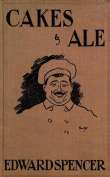قراءة كتاب Cakes & Ale A Dissertation on Banquets Interspersed with Various Recipes, More or Less Original, and anecdotes, mainly veracious
تنويه: تعرض هنا نبذة من اول ١٠ صفحات فقط من الكتاب الالكتروني، لقراءة الكتاب كاملا اضغط على الزر “اشتر الآن"

Cakes & Ale A Dissertation on Banquets Interspersed with Various Recipes, More or Less Original, and anecdotes, mainly veracious
and imagination fail, try the British Museum. You know what is a mightier factor than both sword and pen? Precisely so. And remember that in replenishing your store from the works of those who have gone before, you are only following in their footsteps. I only bar Sydney Smith and Charles Lamb. Let me have the script by Christmas—d’you smoke?—mind the step—good morning.”
In this way, gentle reader, were the trenches dug, the saps laid for the attack of the great work. The bulk of it is original, and the adventures in which the writer has taken part are absolutely true. About some of the others I would not be so positive. Some of the recipes have previously figured in the pages of the Sporting Times, the Lady’s Pictorial, and the Man of the World, to the proprietors of which journals I hereby express my kindly thanks for permission to revive them. Many of the recipes are original; some are my own; others have been sent in by relatives, and friends of my youth; others have been adapted for modern requirements from works of great antiquity; whilst others again—I am nothing if not candid—have been “conveyed” from the works of more modern writers, who in their turn had borrowed them from the works of their ancestors. There is nothing new under the sun; and there are but few absolute novelties which are subjected to the heat of the kitchen fire.
If the style of the work be faulty, the reason—not the excuse—is that the style is innate, and not modelled upon anybody else’s style. The language I have endeavoured to make as plain, homely, and vigorous as is the food advocated. If the criticisms on foreign cookery should offend the talented chef, I have the satisfaction of knowing that, as I have forsworn his works, he will be unable to retaliate with poison. And if the criticisms on the modern English methods of preparing food should attract the attention of the home caterer, he may possibly be induced to give his steam-chest and his gas-range a rest, and put the roast beef of Old England on his table, occasionally; though I have only the very faintest hopes that he will do so. For the monster eating-houses and mammoth hotels of to-day are for the most part “run” by companies and syndicates; and the company within the dining-room suffer occasionally, in order that dividends may be possible after payment has been made for the elaborate, and wholly unnecessary, furniture, and decorations. Wholesome food is usually sufficient for the ordinary British appetite, without such surroundings as marble pillars, Etruscan vases, nude figures, gilding, and looking-glasses, which only serve to distract attention from the banquet. It is with many a sigh that I recall the good old-fashioned inn, where the guest really received a warm welcome. Nowadays, the warmest part of that welcome is usually the bill.
It is related of the wittiest man of the nineteenth century, my late friend Mr. Henry J. Byron, that, upon one occasion, whilst walking home with a brother dramatist, after the first performance of his comedy, which had failed to please the audience, Byron shed tears.
“How is this?” inquired his friend. “The failure of my play appears to affect you strangely.”
“I was only weeping,” was the reply, “because I was afraid you’d set to work, and write another.”
But there need be no tears shed on any page of this food book. For I am not going to “write another.”
CONTENTS
| CHAPTER I | |
| BREAKFAST | |
| Formal or informal?—An eccentric old gentleman—The ancient | |
| Britons—Breakfast in the days of Good Queen Bess—A | |
| few tea statistics—Garraway’s—Something about coffee—Brandy | |
| for breakfast—The evolution of the staff of life—Free | |
| Trade—The cheap loaf, and no cash to buy it | Pages 1-9 |
| CHAPTER II | |
| BREAKFAST (continued) | |
| Country-house life—An Englishwoman at her best—Guests’ | |
| comforts—What to eat at the first meal—A few choice | |
| recipes—A noble grill-sauce—The poor outcast—Appetising | |
| dishes—Hotel “worries”—The old regime and the new—“No | |
| cheques”; no soles, and “whitings is hoff”—A | |
| halibut steak—Skilly and oakum—Breakfast out of the | |
| rates | 10-21 |
| CHAPTER III | |
| BREAKFAST (continued) | |
| Bonnie Scotland—Parritch an’ cream—Fin’an haddies—A knife | |
| on the ocean wave—À la Français—In the gorgeous East—Chota | |
| hazri—English as she is spoke—Dâk bungalow fare—Some | |
| quaint dishes—Breakfast with “my tutor”—A Don’s | |
| absence of mind | 22-33 |
| CHAPTER IV | |
| LUNCHEON | |
| Why lunch?—Sir Henry Thompson on overdoing it—The children’s | |
| dinner—City lunches—“Ye Olde Cheshyre Cheese”—Doctor | |
| Johnson—Ye pudding—A great fall in food—A | |
| snipe pudding—Skirt, not rump steak—Lancashire hot-pot—A | |
| Cape “brady” | 34-43 |
| CHAPTER V | |
| LUNCHEON (continued) | |
| Shooting luncheons—Cold tea and a crust—Clear turtle—Such | |
| larks!—Jugged duck and oysters—Woodcock pie—Hunting | |
| luncheons—Pie crusts—The true Yorkshire pie—Race-course | |
| luncheons—Suggestions to caterers—The “Jolly | |
| Sandboys” stew—Various recipes—A race-course sandwich—Angels’ | |
| pie—“Suffolk pride”—Devilled larks—A light lunch | |
| in the Himalayas | 44-58 |


